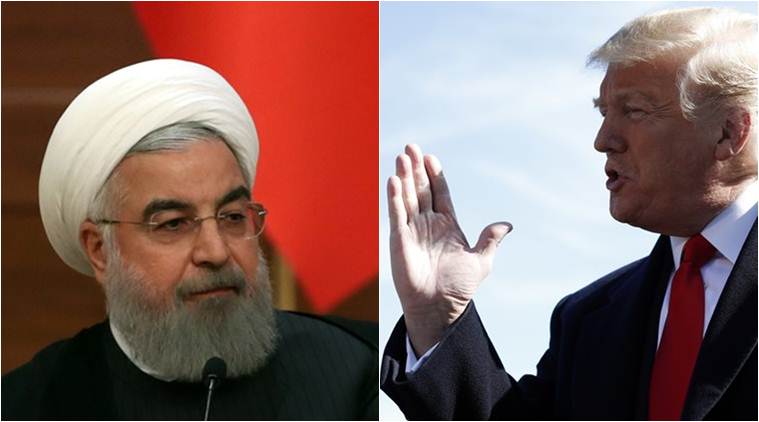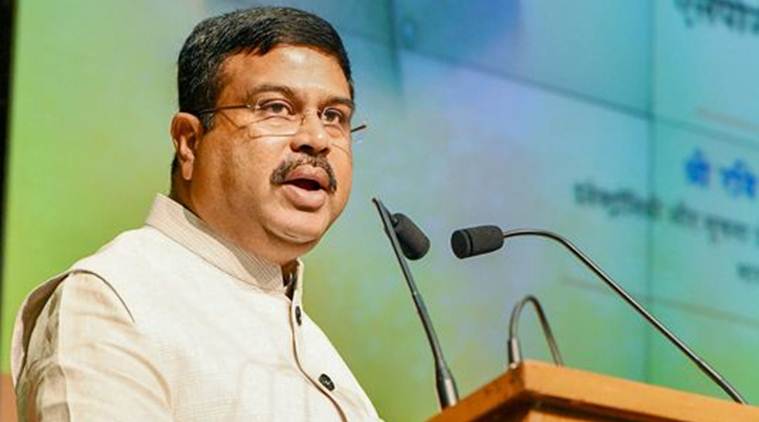US sanctions against Iran come into force: Will it affect India?
While US Secretary of State Mike Pompeo called it "the toughest sanctions ever put in place on Iran", Iran's President Hassan Rouhani said the Islamic republic "will proudly bypass sanctions".

Iran President Hassan Rouhani and his US counterpart Donald Trump. (File)
US sanctions against Iran came into effect on Monday, erasing former President Barack Obama’s 2015 agreement to ease harsh restrictions on the oil-rich country in exchange for curbing its nuclear ambitions. While US Secretary of State Mike Pompeo called it “the toughest sanctions ever put in place on Iran”, Iran’s President Hassan Rouhani said the Islamic republic “will proudly bypass sanctions”.
The fresh restrictions will hit oil exports, shipping and banks — all core parts of the Iranian economy and will also directly affect companies from third countries doing business with the West Asian country. It remains to be seen if the development leads to a rise in crude oil prices after it eased in the past few days, though the US has granted temporary waivers to eight countries to continue importing Iranian oil.
India, which imports over 17 per cent of its oil from Iran, is among the eight countries granted a temporary exemption, Oil Minister Dharmendra Pradhan confirmed on Saturday even though the US is yet to officially announce the list. The exemption, for now, is expected to help ease the pressure on crude prices a major concern of the Narendra Modi government.
Why did the US reimpose sanctions on Iran?
The restoration of sanctions is part of a wider effort by US President Donald Trump to force Iran to curb its nuclear and missile programs as well as its support for proxy forces in Yemen, Syria, Lebanon and other parts of the Middle East. Calling the Obama-era sanctions “defective to the core”, Trump pulled out of the agreement in May. The deal was been signed alongside the UK, France, Germany, China and Russia, and was endorsed by the UN Security Council.
More than 700 individuals, entities, vessels and aircraft are now on the sanctions list, including major banks, oil exporters and shipping companies. Pompeo said more than 100 big international companies have withdrawn from Iran because of the looming sanctions.
How will the sanctions impact Iran and oil trade?
Oil is Iran’s main source of income and is also the third-largest producer among the Organization of the Petroleum Exporting Countries (OPEC). In 2018, Iran exported about 2.7 million barrels per day. Through its sustained pressure, the US has managed to reduce Iran’s oil exports from 2.7 million to 1.6 million barrels a month, according to internal US estimates.
The sanctions also come at a time when Iran is already in the grip of an economic crisis. The rial now trades at 145,000 to $1, compared with 40,500 to $1 a year ago. The economic chaos prompted mass anti-government protests at the end of last year that resulted in nearly 5,000 reported arrests and at least 25 people being killed.
In addition, the Brussels-based Swift network for making international payments is expected to cut off links with targeted Iranian institutions, isolating Iran from the international financial system. The measures will mainly affect Iranian companies in direct business with other foreign firms. Saudi Arabia, the leading player of the OPEC committee, has said that it would fill in for the lost supply.
How has Iran reacted to US sanctions?
On Monday, Iran said it would defy US sanctions and denounced it as an “economic war”. Iranian President Hassan Rouhani vowed to continue selling its crude oil in the international market despite the measures. “We should break the sanctions very well and we will do that,” AFP quoted Rouhani as saying.
Calling the US a “bullying power”, Rouhani further said Trump was against the law and international conventions. “We are in a situation of economic war, confronting a bullying power. I don’t think that in the history of America, someone has entered the White House who is so against law and international conventions,” he said.
On Sunday, thousands of Iranians rallied in Tehran to mark the 39th anniversary of the US Embassy takeover. The crowd chanted “Down with US” and “Death to Israel” during the rally in the capital as anger and distrust surged against America.
Which countries are exempt from the sanctions and what are the terms?
The Trump administration has granted exemptions to eight countries to continue importing Iranian oil since they have made “significant reductions” in oil imports, including Japan, India and South Korea. Pompeo has said that countries like India, if granted exemption, would be asked to bring down oil imports from Iran to zero in six months.
Countries that get waivers under the revived sanctions must pay for the oil into escrow accounts in their local currency. That means the money won’t directly go to Iran, which can only use it to buy food, medicine or other non-sanctioned goods from its crude customers. The administration sees those accounts as an important way of limiting Iranian revenue and further constraining its economy.
How will the sanctions impact India?
India, which is the second biggest buyer of Iranian oil after China, is being pushed by the US to restrict its monthly purchase to 1.25 million tonnes or 15 million tonnes a year (300,000 barrels per day), down from 22.6 million tonnes (452,000 barrels per day) bought in 2017-18 financial year, according to sources.
New Delhi, however, has pushed back on zero oil imports citing the adverse impact on its economy and the inflationary impact it would have. Oil Minister Dharmendra Pradhan on Saturday said India was among the countries that have been granted a waiver from the US sanctions on Iran.
“Hon’ble Prime Minister’s forceful campaign has been that you can’t ignore interests of consuming countries. Understanding the geopolitical situation, India has been able to get its way. The US has given a waiver to some countries, including India,” Pradhan said.
Meanwhile, India and Iran are working on a rupee-based payment arrangement with UCO Bank and Bank Pasargad. Using this mechanism, the government is hoping to continue importing 125 million tonnes of crude through March. During the previous sanctions regime, India adopted a barter-like scheme to buy oil from Iran while the Middle Eastern country used rupees to import goods from India.
What has the European Union and China said?
The European Union, France, Germany and Britain said in a joint statement that they regretted the US decision and would seek to protect European companies doing legitimate business with Tehran.
On the other hand, China denounced the new US sanctions as “long-arm jurisdiction” and vowed to continue its bilateral trade with the Islamic republic. “China opposes unilateral sanctions and long-arm jurisdiction. We believe that China’s normal cooperation (with Iran) within international law is legal and legitimate, and this shall be respected,” Foreign Ministry spokeswoman Hua Chunying said.
 Oil Minister Dharmendra Pradhan on Saturday said India was among the countries that have been granted a waiver from the US sanctions on Iran. (File)
Oil Minister Dharmendra Pradhan on Saturday said India was among the countries that have been granted a waiver from the US sanctions on Iran. (File)





































No hay comentarios:
Publicar un comentario